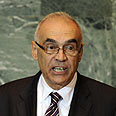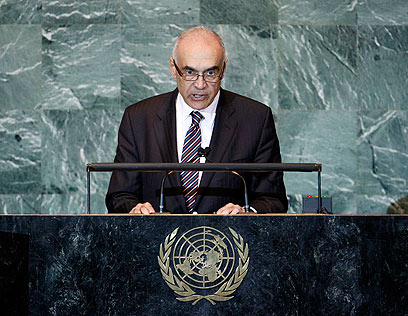
Egyptian FM backs treaty with Israel
Mohamed Amr asserts Egypt will always respect 1979 Camp David accords with Israel, adds Cairo seeking to strengthen 'strategic relationship' with Obama administration
Egypt's Foreign Minister Mohamed Amr said Monday his country will always respect its landmark peace treaty with Israel and is seeking ways to strengthen its "strategic relationship" with the United States.
Amr's comments come at a time of mounting concern about deteriorating Israeli-Egyptian relations and Washington's diminished influence on the Cairo government following the ouster of long-time President Hosni Mubarak in February.
Related stories:
- Egyptian FM to UN: Israel's acts criminal
- Palestinian FM: Quartet proposal favors Israel
- Israeli diplomats return to Egypt
Amr appeared to backpedal on comments last week by Egyptian Prime Minister Essam Sharaf, who said the 1979 treaty with Israel was not "sacred" and may be open to revisions in the future.
His remarks triggered alarm bells in Israel, which saw its embassy in Cairo ransacked by rioters earlier this month following protests over the killing of six Egyptian border guards by Israeli soldiers pursuing Palestinians who had infiltrated and killed eight Israelis.
Amr said relations between Egypt and Israel were governed by the US-brokered peace agreement and that Cairo honored all its treaty commitments as long as the other party did the same "in letter and in spirit."
Asked if Israel had run afoul of the spirit or letter of the 1979 agreement, Amr said: "No, I don't mean Israel in particular. I mean our agreements in general."
He stressed that Egypt will always respect its treaty obligations, including the peace deal with Israel. He said in response to a question that this meant there is no chance the peace treaty would be abrogated or changed, adding, "We respect our obligations."
Anti-American sentiment in Egypt?
Mubarak had largely kept the peace between his country and Israel despite popular resentment toward the US-brokered Camp David accords, which included a framework for peace in the Middle East and another detailing the terms of peace between Egypt and Israel. The United States had a much closer relationship with Mubarak, and since his ouster the Obama administration has expressed concern about a "creeping" trend of anti-American sentiment in Egypt.
Asked about concerns over the state of US-Egyptian relations, Amr said he was heading to Washington for talks Tuesday and Wednesday with senior US officials including Secretary of State Hillary Rodham Clinton.
"We always have strong relations with the United States," he said. "This is not limited to one era or one regime, this is a strategic relationship that benefits both sides actually, not only one side. ... I think both parties are very much interested in not only maintaining their relationship but also strengthening it in the future."
Amr, a former diplomat who worked at the World Bank before being tapped as foreign minister by the new government in July, said Egypt is passing through "exciting times" following the popular uprising that toppled Mubarak.
He downplayed concerns that a potential strong showing by supporters of the Muslim Brotherhood in parliamentary elections could pose challenges to the current government's goal of shifting Egypt from an autocratic nation to a democratic state.
"Whatever outcome will come through the ballot box (it) should be and must be respected," he said.
The Muslim Brotherhood was the best organized and most influential opposition movement in Egypt under Mubarak's regime, but had to field candidates as independents in the past and its influence was largely subverted - at least in official channels - by the former ruling National Democratic Party.
Many in Egypt are worried that a strong showing by the Brotherhood, as it is known, could push the country away from the framework of a largely secular state.
Despite the challenges, Amr said he was optimistic about the future of Egypt and its Arab neighbors.
The popular uprisings in Tunisia and Egypt have sparked movements for democratic change elsewhere in the region, "and this shows you again that Arab people have more in common than maybe outsiders think," he said.
- Follow Ynetnews on Facebook
- Receive Ynetnews updates directly to your desktop












